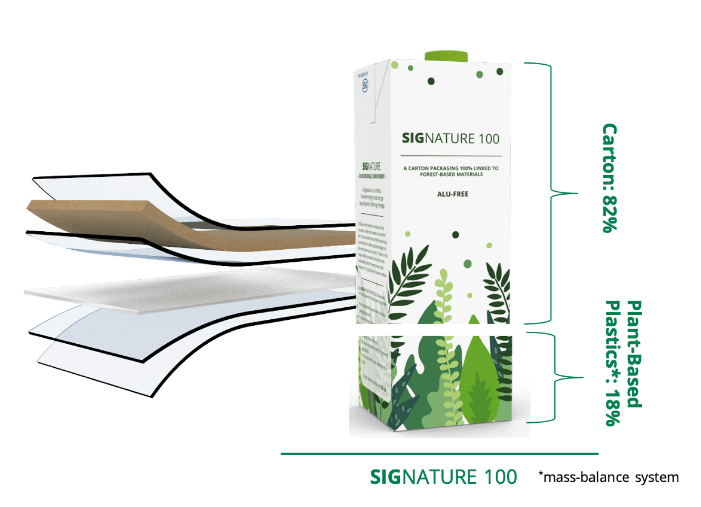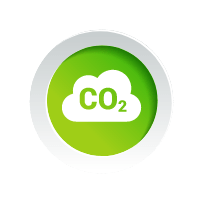Forest-Based Materials
Why is it sustainable to shift to forest-based materials?
Conventional plastics are made from non-renewable sources. To not exploit these sources SIG has launched its SIGNATURE portfolio. SIGNATURE 100 is designed for the highest renewable share of 100% linked to mass-balance. All plastics used, including the closure, to manufacture the pack are linked to renewable forest-based materials. The main material of the SIGNATURE 100 is carton-board. The paperboard used comes from socially and environmentally responsible forestry, which complies with the Forest Stewardship CouncilTM (FSCTM) standards.
The FSCTM label informs consumers about a responsible sourcing of wood material during the manufacturing process of a product.
FSCTM LABEL
What does it mean when you see a FSCTM label on a product?
The FSCTM label guides customers to choose FSCTM labelled products which are certified to the highest standard of sustainable forestry. The label provides information about the origin of the materials used to make the product and ensures a responsible sourcing of wood material.
The SIGNATURE 100 is FSCTM certified:
100% of the paperboard used to manufacture the SIGNATURE 100 pack comes from paper mills that have an FSCTM certified chain of custody.
(license code: FSCTM C020428)
ALUMINUM-FREE PACKAGING
What is sustainable about an alu-free beverage carton?
Offering an alu-free packaging while ensuring highest standards to food quality is challenging, as the aluminium layer provides protection from light, oxygen and maintains the product’s aroma. The SIGNATURE 100 is designed specifically for white UHT milk. It is the world’s first alu-free beverage carton linked to 100% forest-based plastics.
The elimination of the aluminium layer reduces the carton’s carbon footprint. Check out the CO2 reduction button to learn more.
Learn more about the SIGNATURE 100 Pack on our website:
 SIGNATURE PACK
SIGNATURE PACK
CO2 REDUCTION
What’s the SIGNATURE 100 carbon footprint?
The elimination of the aluminium layer plus renewable plastics result in a reduction of the carton’s carbon footprint by 58%*. The SIGNATURE 100 structure supports SIG in its mission to produce fully renewable, low carbon packaging.
*Reference to EU average and compared to combiblocSlimline Standard 1L + combiSwift closure
FULLY RECYCLABLE
Recycling helps to protect the environment
We want more people to make recycling part of their routine to help keep high-quality materials in circulation, prevent valuable natural resources going to waste and avoid environmental impacts from landfill. Every part of a beverage carton can be recycled.
The paper fibres that make up around 75% of each beverage carton remain long, strong and high-quality even after they are recovered from used cartons. The small amounts of polymer and aluminium from cartons can be recycled together to make hard-wearing products like roof tiles and garden furniture.









